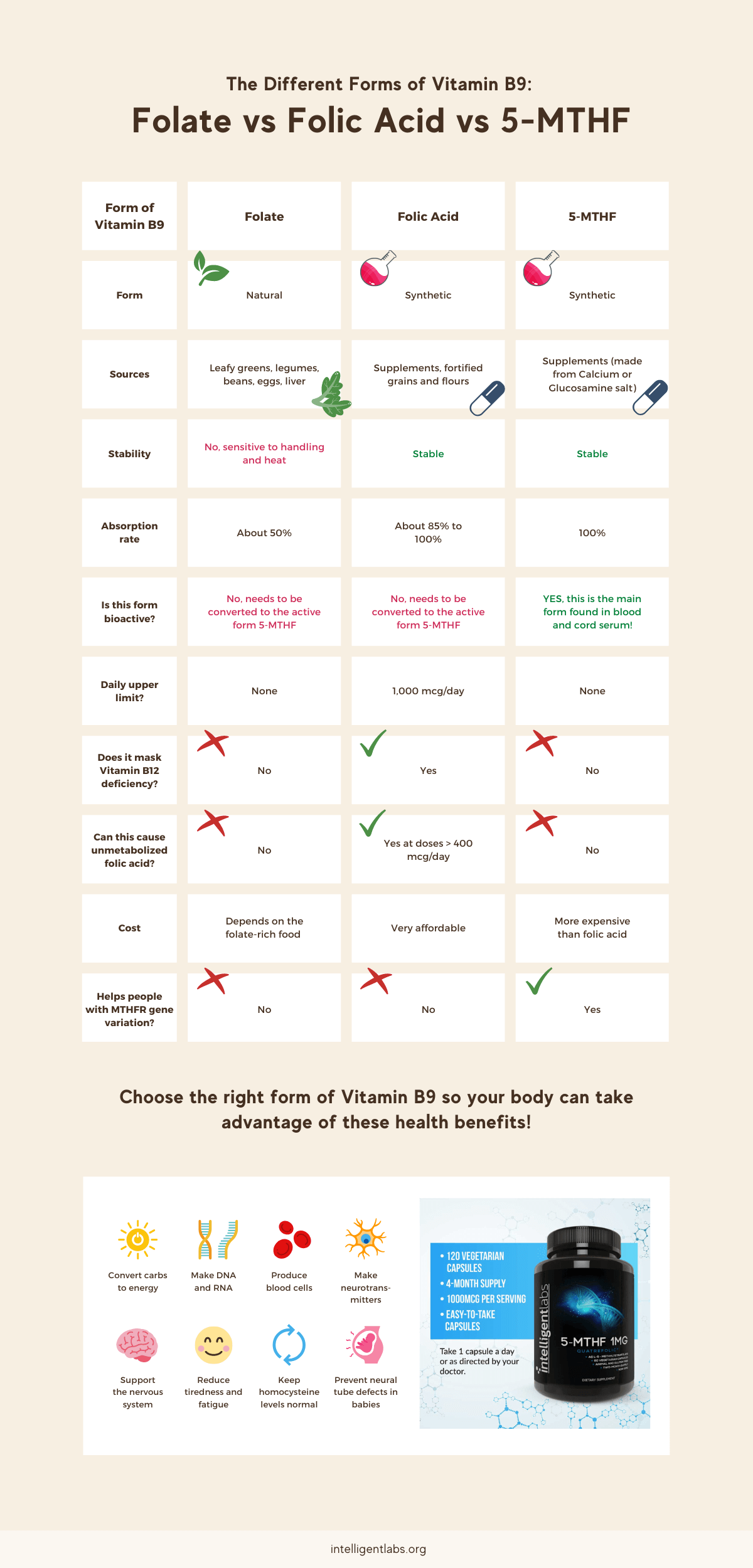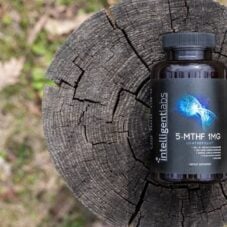Folic acid for men… an interesting topic, eh? We’ve all heard how important folic acid is for teenage girls and women, how they should be taking at least 400 mcg daily to prepare for a possible pregnancy and prevent birth defects in their unborn baby. But what about boys and men? Do they need to take folic acid, too? Are there any benefits specifically for guys? Let’s find out in this article!
Table of Contents
How can folic acid help men?
Folic acid is the synthetic version of folate, the natural form of vitamin B9. By synthetic, we mean it’s man-made. Folic acid is more stable than folate and is the form added to fortified foods like flours and cereals, as well as multivitamins and supplements.
Here are some of the many benefits of folic acid for men:
Folic acid plays a vital role in a man’s well-being
Folic acid is required for many important biological processes. It contributes to:
- DNA and RNA synthesis
- normal blood formation
- amino acid synthesis
- energy production
- homocysteine metabolism
- immune function
- neurotransmitter production
Folic acid for men may help improve healthy pregnancy outcomes
Without a doubt, folic acid is important for all females of childbearing age. But the same thing actually goes for guys! Healthy sperm DNA is necessary for a healthy pregnancy. Sperm DNA damage has been linked to an increased risk of miscarriage and malformation in babies (1).
There is some evidence that males with low folate levels at the time of conception may increase the risk of an unhealthy pregnancy. Here are some fascinating findings from a study done on mice (2):
- Mice fed with a folate-deficient (FD) diet were found to have DNA damage in their sperm and fertility was compromised by a lower pregnancy rate compared to mice fed with a folate-sufficient (FS) diet.
- When the FD mice did manage to impregnate the female mice, their offspring had major developmental abnormalities, such as facial deformities, and limb and spine defects.
- On the other hand, the FS mice offspring only had minor abnormalities, such as skin discoloration. A runt was also born in one of the litters.
What does this mean for guys?
If you and your partner are planning to have a child together, then it’s best to get your folate levels up to ensure your sperm remains healthy. Doing so will help reduce the risk of a negative pregnancy outcome.

Folate helps with homocysteine metabolism
Homocysteine is a chemical that is produced during the metabolism of methionine (in the folate cycle). High levels of this chemical in the blood may increase the risk of cardiovascular disease, stroke, Alzheimer’s, dementia, cancer, Parkinson’s, osteoporosis, and atherosclerosis. Fortunately, a diet rich in vitamin B9 can help keep homocysteine levels under control (3).
Folate may help prevent stroke and heart disease
As mentioned above, high levels of homocysteine can increase the risk of cardiovascular or heart disease. Unfortunately, heart disease is the leading cause of men in the US – approximately 1 out 4 male deaths, in fact! (4)
A 2019 meta-analysis of 12 randomized controlled trials involving over 47,000 subjects shared incredible results. Patients with cardiovascular disease who received folic acid therapy had a significantly reduced risk of stroke, which is great news for those afflicted by this disease (5).
Folate may help with depression
Folate plays a key role in the production of neurotransmitters like serotonin (the happy hormone), dopamine (the motivation and reward hormone), and norepinephrine (fight or flight response hormone) (6).
Bender and colleagues said there is a correlation between lower blood folate levels and depression. And that supplementing with L-methylfolate a.k.a. 5-MTHF (the active form of folate) may help alleviate symptoms of depression (7).
Is it better for men to take folate or folic acid?
Folate and folic acid are used interchangeably nowadays. But they are actually different not just in terms of where you can find them, but also in how the body metabolizes each form.
Both folate and folic acid need to be converted to the active form, 5-methyltetrahydrofolate or 5-MTHF so the body can use it. 5-MTHF is the main form of vitamin B9 found in blood and cord serum (8).
Another important concern about taking folic acid, especially in high doses, is that it can lead to unmetabolized folic acid circulating in the blood. This buildup doesn’t occur when eating folate-rich foods or supplementing with 5-MTHF (9).
Unmetabolized folic acid might be linked to adverse health conditions, such as lowering immunity levels as well as causing certain forms of cancer to accelerate. However, research is still lacking, and more evidence is needed before definitive conclusions can be made. For now, it’s better to err on the side of caution.
Basically, what this means is that the best form of folate to take would be 5-MTHF activated folic acid since it needs no further conversions in the body. This is especially helpful for men with the MTHFR genetic variation who are unable to convert either folate or folic acid into 5-MTHF.
Here’s an infographic showing the key differences between folate, folic acid and 5-MTHF activated folic acid:

What are the symptoms of folate deficiency in men?
Folate deficiency is probably easier to spot in women than men. A point in fact is that women who are folate-deficient are at risk of giving birth to a child with neural tube defects (NTD).
Apart from this telltale sign (NTD in a baby), diagnosing folate deficiency isn’t easy. This is because there is an overlap in the symptoms of folate deficiency and a lack of other B vitamins, especially vitamin B12. A blood test will need to be done if you suspect a deficiency and you present any of the symptoms below.
Being deficient in folate and/or vitamin B12 can lead to a type of anemia known as megaloblastic anemia. This condition is characterized by red blood cells that are larger than normal, not fully developed, and therefore not functioning properly. Symptoms of anemia include (10):
- Chronic fatigue
- Shortness of breath
- Extra pale skin
- Tingling sensation in hands/feet
- Irritability
- Heart palpitations
- Muscle weakness
- Memory problems
Apart from anemia, folate deficiency can also cause the following (11):
- Mouth ulcers
- Peptic ulcer
- Gray hair
- Diarrhea
- Stunted growth
- Swollen tongue
What’s the proper dosage for guys?
Here’s the recommended dosage for folic acid for boys and men (12):
| Life Stage | Recommended Amount |
| Birth to 6 months | 65 mcg DFE |
| Infants 7-12 months | 80 mcg DFE |
| Children 1-3 years | 150 mcg DFE |
| Children 4-8 years | 200 mcg DFE |
| Children 9-13 years | 300 mcg DFE |
| Teens 14-18 years | 400 mcg DFE |
| Adults 19+ years | 400 mcg DFE |
DFE stands for dietary folate equivalent.
1 mcg DFE is equal to:
- 1 mcg food folate
- 0.6 mcg folic acid from fortified foods or supplements (when consumed with food)
- 0.5 mcg folic acid from supplements (when taken on an empty stomach)
When taking folic acid (as opposed to folate and/or 5-MTHF), it’s best to stick to the recommended doses to prevent the occurrence of unmetabolized folic acid in the body.
Conclusion
Folic acid may be well known for its prenatal health benefits, but it’s far from being a female-centric nutrient. Folic acid is beneficial for both men and women. For optimal absorption, use the bioactive form of folate – 5-MTHF – to ensure you get all the benefits of this important vitamin.
💬 Something on your mind? Share your thoughts in the comments. We love hearing from curious minds.
📩 And while you’re here, join our newsletter for more smart stuff (and secret perks)!
References
(1) Comparison of Chromatin Assays for DNA Fragmentation Evaluation in Human Sperm, Kazim R. Chohan, Jeanine T. Griffin, Marie Lafromboise, Christopher J. De Jonge, Douglas T. Carrell, Journal of Andrology, Volume 27, Issue 1 p. 53-59
(2) Low paternal dietary folate alters the mouse sperm epigenome and is associated with negative pregnancy outcomes. Lambrot, R., Xu, C., Saint-Phar, S. et al. Nat Commun 4, 2889 (2013).
(3) Homocysteine: Friend or Foe? Joseph Pizzorno, Integr Med (Encinitas). 2014 Aug; 13(4): 8–14.
(4) Men and Heart Disease, taken from: https://www.cdc.gov/heartdisease/men.htm
(5) The effect of folic acid in patients with cardiovascular disease: A systematic review and meta-analysis. Wang Y, Jin Y, Wang Y, et al. Medicine (Baltimore). 2019;98(37):e17095.
(6) Folate in depression: efficacy, safety, differences in formulations, and clinical issues. Fava M, Mischoulon D. J Clin Psychiatry. 2009;70 Suppl 5:12-17.
(7) The association of folate and depression: A meta-analysis, Ansley Bender, Kelsey E. Hagan, Neal Kingston, Journal of Psychiatric Research, Volume 95, December 2017, Pages 9-18
(8) Folate, folic acid and 5-methyltetrahydrofolate are not the same thing, Francesco Scaglione, Giscardo Panzavolta, Pages 480-488 | Received 12 Jul 2013, Accepted 13 Sep 2013, Published online: 04 Feb 2014
(9) Circulating Unmetabolized Folic Acid: Relationship to Folate Status and Effect of Supplementation, Carolyn Tam, Deborah O’Connor and Gideon Koren, Research Article | Open Access Volume 2012 | Article ID 485179
(10) Vitamin B12 or folate deficiency anaemia, taken from; https://www.nhs.uk/conditions/vitamin-b12-or-folate-deficiency-anaemia/
(11) Folic acid in diet, taken from: https://medlineplus.gov/ency/article/002408.htm
(12) Folate, Fact Sheet for Health Professionals, taken from: https://ods.od.nih.gov/factsheets/Folate-HealthProfessional/




